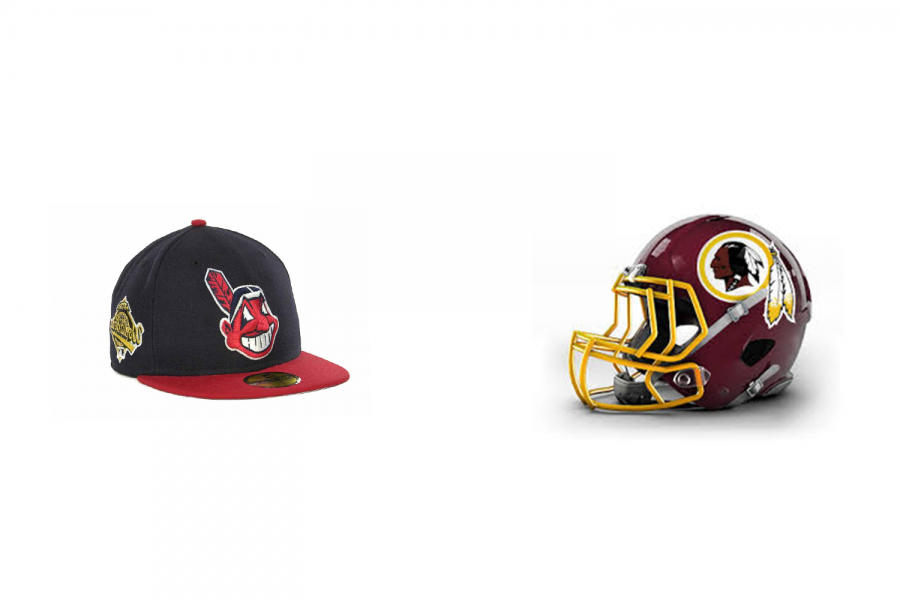In Washington, an NFL Team Clings Stubbornly to Tradition
This year, the Cleveland Indians made the decision to change their controversial mascot. Will other teams follow their lead?
Congrats Cleveland – after about a century of cheering for “Wahoo,” a racist, red, Native-American caricature, you are finally doing what you have been asked to for so long: Getting rid of the dehumanizing thing! Now it’s time for others to follow suit.
When a country is founded on racist institutions like slavery and the genocide of indigenous people, it is inevitable that one day, it will have to face this history and choose to uphold or condemn it. The recent Confederate statue controversy demonstrates this idea, where backlash showed that change can be very, very hard for some Americans to accept. It remains that American history is painful, but the future doesn’t have to be so. We can have less Robert E. Lee monuments and less Wahoo’s if we put a future of inclusivity over racist tradition and educate those who are blinded by ignorance.
But when teams have been asked time and time again to change and still refuse to accept that what they are doing is offensive and dehumanizing, it is obvious that ignorance is not the issue, but a lack of respect for the nation’s indigenous people. What is respected more than Native culture is the culture of cash – the money flowing in from merchandise and tickets covered in caricatures and slurs.
In Washington DC, the nation’s capitol, football players wear helmets picturing a Native man with a two feathers in his braids. “It represents honor, it represents pride and it represents respect,” Redskins team owner Daniel Snyder said in an interview with The Daily Show. “The name really means honor.” While there are rare teams whose mascots have been approved by local tribes as ‘respectful’, the Redskins is not one of those teams. This may be because the term ‘redskin’ is not respectful; it is a slur. In fact, it originated as a term used to describe the dismembered scalp of a Native person which was used as bounty in the 1800’s. Where Snyder– who is not Native himself–sees honor, pride, and respect, history reveals a reality much darker.
And although there are many activists both Native and non-Native dedicated to the mascot cause, the Washington Post held an online poll in 2016 questioning whether the majority of indigenous Americans were actually offended by the “redskins.” A slim nine percent reported that they found the mascot offensive, while 21 percent felt that the term was offensive in general. Still, the validity of the poll has been questioned– one issue being lack of specificity in the poll regarding legitimate Native identity–and another factor remains that the issue doesn’t rank in high importance for many Native-Americans.
Clearly, it is impossible to speak for a whole community, and an extremely diverse community at that. Still, the fact is that even if only one in ten people are bothered by a team name, there might be something wrong with it. Nobody needs to ask questions or to run a poll about the Lions or the Eagles and it’s not hard to figure out why. It’s pretty simple: mascots are generally inanimate objects, animals or occasionally a historical figure, like a Spartan warrior, for example. Using a slur for a whole ethnic group as a mascot is dehumanizing and insinuates that they exist strictly in the past, all while ignoring the tumultuous and complicated history between indigenous people and the government, which happens to be based in the team’s hometown.
So, Snyder and Redskins management, if you want a second (well, more like hundredth at this point) chance at being on the right side of history, change the name! Yes, there’s always going to be someone complaining about political correctness or a slippery slope; but GreenPeace probably isn’t going to start protesting a Panthers game anytime soon. Unfortunately, the Redskins are not an anomaly–hundreds of offensive mascots exist on the middle, high school and college levels. But if the influential NFL team were to make such a decisive move as getting rid of their distasteful mascot, it might just encourage other teams to really think about the history behind their team spirit.










